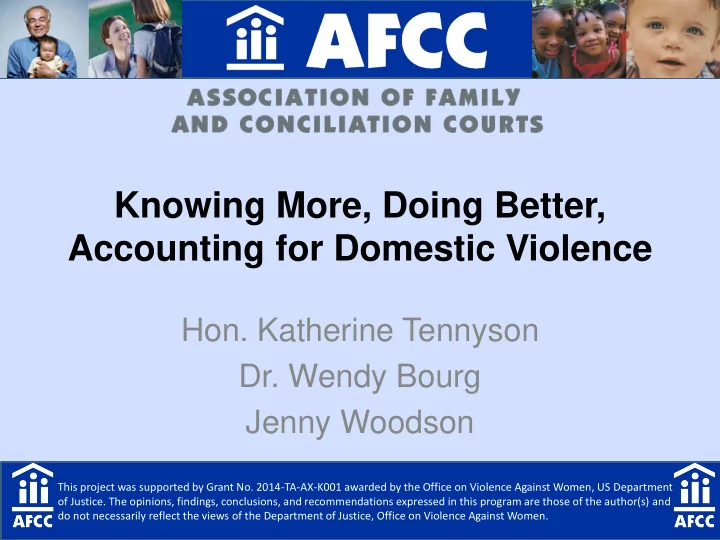

Knowing More, Doing Better, Accounting for Domestic Violence Hon. Katherine Tennyson Dr. Wendy Bourg Jenny Woodson This project was supported by Grant No. 2014-TA-AX-K001 awarded by the Office on Violence Against Women, US Department of Justice. The opinions, findings, conclusions, and recommendations expressed in this program are those of the author(s) and do not necessarily reflect the views of the Department of Justice, Office on Violence Against Women.
Objectives After this training you should be able to: • Understand steps to initiate coordinated practice change in your communities • Identify significant gaps in current family court practice when evaluating the impact of domestic violence in parenting and child wellbeing • Develop and implement promising tools, protocols, and resources for improving their work with victims and their families
Family Court Enhancement Project • Demonstration grant from the Office on Violence Against Women • 4 sites chosen nationally-initially for a technical assistance grant-decided to offer noncompetitive grants to the sites • Goal: To improve the family court response in cases involving domestic violence so that resulting parenting and co-parenting arrangements protect the emotional and physical well-being of victimized parents and their children.
Mapping Started with pre-identified people, process, or hearings in a family law case. • Green – action • Yellow – hearing • Blue – people/services • Pink – wish list • Orange – law enforcement • Green Dots – going well • Red Dots – going poorly • Blue Dots – could use some attention
Mapping Going well: • Community based advocates • Mediation process • One family – one judge policy • Supervised parenting time Not going well: • Understanding race/class/gender issues • Court staff interactions with litigants • Custody evaluation • Mental health and CW interventions with families
Our Problem Areas • Families facing DV and those who assist them often lack the information • Family Law Professionals often do not adequately account for the implications of domestic violence in custody and parenting time decisions and recommendations • Litigants with DV as a primary issue in their custody or parenting time case don’t feel understood, respected, or treated fairly and the courts lack methods to receive feedback
Bigger Picture Focus groups and Interviews • 41 survivors, most women of color, 4 groups in languages other than English • 2 focus groups with attorneys • 3 interviews with Custody Evaluators • 3 interviews with attorneys representing children Surveys to Professionals about their experiences Surveys to litigants
Agreement • We were on the right track with focus groups • Everyone wanted shared definition of DV • Judge perceived as biased • Custody Evaluators missing the mark • People of color have concerns about racism in the courts • Non-English speaking survivors all reported having issues with interpretation
Beliefs Professionals thought they knew all there is to know about DV • Lack of understanding of Coercive control • Dismissing DV concerns-not common, not bad, women lie • Feel can recognize “real” victim
Not analyzing DV thoroughly when recommending/deciding custody and parenting time • Conflict with “friendly parent” statutes • Cases “high conflict” and not DV • Lack of understanding about post separation violence
Did not understand roles • Advocacy vs. neutrality • Who brings info to court? • No one asks because the victim or provider doesn’t mention -not seen as important
Now What? Domestic Violence is identified: • Unsure how to bring to court • How do I help this person? How does the DV impact parenting?
Tools & Training • Created Tool for attorneys and custody evaluators • Extensive training on Battered Women’s Justice Project’s Practice Guide for Family Court Decision-Making In Domestic Abuse Related Child Custody Matters
Relationship Building • Hard Conversations • Invite professionals not normally part of conversations • Ask for people’s opinions - get good information, know potentially problematic beliefs and trends, create investment in changes, and educate • Cater training and tools to their needs
Use Experts • Many local experts in your community • National experts that provide assistance: – Association of Family and Conciliation Court – Battered Women’s Justice Project – Center for Court Innovation – National Council of Juvenile and Family Court Judges
Recommend
More recommend